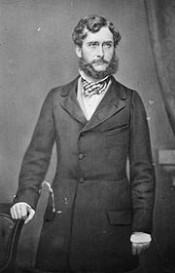Motley John Lothrop

John Lothrop Motley (Dorchester, near Boston, Massachussets, April 15, 1814–near Dorchester, England, May 29, 1877) was an American historian. The son of Thomas Motley, he was born at Dorchester (now a neighborhood of Boston, Massachusetts), attended the Round Hill School, Boston Latin School, and graduated from Harvard in 1831. His boyhood was in Dedham, near the site of the present day Noble and Greenough School.[1] During 1832 and 1833 studied at Göttingen, where he became a friend of Otto von Bismarck, and afterwards at Frederick William University, Berlin, meeting him at both universities. After a period of European travel he returned in 1834 to America, where he continued his legal studies. In 1837 he married Mary Benjamin (died 1874), a sister of Park Benjamin, and in 1839 he published anonymously a novel entitled Morton's Hope, or the Memoirs of a Provincial. In 1841 he entered the diplomatic service as secretary of legation in St. Petersburg, Russia, but resigned his post within three months , because, according to him in a letter to his mother, of the harsh climate, the expenses living there and his reserved habits. Returning to America, he soon entered definitely upon a literary career. Besides contributing various historical and critical essays to the North American Review, such as "life and Character of Peter the Great, (1845) and a remarkable essay on the Polity of the Puritans, he published in 1849, again anonymously, a second novel, entitled Merry Mount, a Romance of the Massachusetts Colony, based again on the odd history of Thomas Morton and Merrymount. In about 1846 he had begun to plan a history of the Netherlands, in particular the period of the United Provinces, and he had already done a large amount of work on this subject when, finding the materials at his disposal in the United States inadequate, he went with his family, wsife and children, to Europe in 1851. The next five years were spent at Dresden, Brussels and The Hague in investigation of the archives, which resulted in 1856 in the publication of The Rise of the Dutch Republic, which became very popular. It speedily passed through many editions, was translated into French, and also into Dutch, German and Russian. In 1860 Motley published the first two volumes of its continuation, The United Netherlands. This work was on a larger scale, and embodied the results of a still greater amount of original research. It was brought down to the truce of 1609 by two additional volumes, published in 1867. The reception of Motley's work in The Netherlands itself was favorable also, especially as Motley described the Dutch struggle for independence in a flattering light (some might say he was biased against their opponents). Historians like Guillaume Groen van Prinsterer (whom Motley extensively quotes in his work) viewed him very favorably. However, the eminent Dutch historian Robert Fruin, (who was inspired by Motley to do some of his own best work), and who had reported already in 1856 in the "Westminster Review" Motley´s edition on the "Rise of the Dutch republic", was critical of Motley's tendency to make up "facts" if they made for a good story (though he admired Motley's gifts as an author and stated that he continued to hold the work as a whole in high regard)[2] In 1861, just after outbreak of the American Civil War, Motley wrote two letters to The Times defending the Federal position, and these letters, afterwards reprinted as a pamphlet entitled Causes of the Civil War in America, made a favourable impression on President Lincoln. Partly owing to this essay, Motley was appointed United States minister to the Austrian Empire in 1861, a position which he filled with great success until his resignation in 1867.[3] Two years later he was sent to represent his country in London, but in November 1870 he was recalled by President Grant. After a short visit to the Netherlands, he again went to live in England, where the Life and Death of John Barneveld, Advocate of Holland, : with a View of the Primary Causes and Movements of the Thirty Years War appeared in two volumes in 1874. Ill health now began to interfere with his literary work, and he died at Frampton Court, near Dorchester, Dorset, leaving three daughters. He was buried in Kensal Green Cemetery, London. Motley's merits as an historian are undeniably great. He told the story of a stirring period in the history of the world with full attention to the character of the actors and strict fidelity to the vivid details of the action, but his writing is best where most unvarnished, and probably no writer of his calibre has owed less to the mere sparkle of highly polished literary style. An edition of his historical works was published in nine volumes in London in 1903–1904. See the Correspondence of John Lothrop Motley, edited by George William Curtis (New York, 1889); Oliver Wendell Holmes, Sr., John Lothrop Motley, a Memoir (Boston, 1878); and John Lothrop Motley and his Family: Further Letters and Records (1910), edited by his daughter, Mrs Susan St John Mildmay. This article incorporates text from the Encyclopædia Britannica, Eleventh Edition, a publication now in the public domain. John Adams 1785-1788 · Thomas Pinckney 1792-1796 · Rufus King 1796-1803 · James Monroe 1803-1807 · William Pinkney 1808-1811 · Jonathan Russell (chargé d'affaires) 1811-1812 John Quincy Adams 1815-1817 · Richard Rush 1818-1825 · Rufus King 1825-1826 · Albert Gallatin 1826-1827 · James Barbour 1828-1829 · Louis McLane 1829-1831 · Martin Van Buren 1831-1832 · Aaron Vail (chargé d'affaires) 1832-1836 · Andrew Stevenson 1836-1841 · Edward Everett 1841-1845 · Louis McLane 1845-1846 · George Bancroft 1846-1849 · Abbott Lawrence 1849-1852 · Joseph R. Ingersoll 1852-1853 · James Buchanan 1853-1856 · George M. Dallas 1856-1861 · Charles Adams, Sr. 1861-1868 · Reverdy Johnson 1868-1869 · John Lothrop Motley 1869-1870 · Robert C. Schenck 1871-1876 · Edwards Pierrepont 1876-1877 · John Welsh 1877-1879 · James Russell Lowell 1880-1885 · Edward J. Phelps 1885-1889 · Robert T. Lincoln 1889-1893 Thomas F. Bayard, Sr. 1893-1897 · John Hay 1897-1898 · Joseph Choate 1899-1905 · Whitelaw Reid 1905-1912 · Walter Page 1913-1918 · John W. Davis 1918-1921 · George Harvey 1921-1923 · Frank B. Kellogg 1924-1925 · Alanson B. Houghton 1925-1929 · Charles G. Dawes 1929-1931 · Andrew W. Mellon 1932-1933 · Robert Bingham 1933-1937 · Joseph P. Kennedy 1938-1940 · John G. Winant 1941-1946 · W. Averell Harriman 1946 · Lewis W. Douglas 1947-1950 · Walter S. Gifford 1950-1953 · Winthrop W. Aldrich 1953-1957 · John Hay Whitney 1957-1961 · David K. E. Bruce 1961-1969 · Walter H. Annenberg 1969-1974 · Elliot L. Richardson 1975-1976 · Anne Armstrong 1976-1977 · Kingman Brewster, Jr. 1977-1981 · John J. Louis, Jr. 1981-1983 · Charles H. Price II 1983-1989 · Henry E. Catto, Jr. 1989-1991 · Raymond G. H. Seitz 1991-1994 · William J. Crowe, Jr. 1994-1997 · Philip Lader 1997-2001 · William S. Farish III 2001-2004 · Robert H. Tuttle 2005-2009 · Louis Susman 2009-
do you like this author?
What readers are saying
What do you think? Write your own comment on this book!
write a commentWhat readers are saying
What do you think? Write your own comment on this author!
write a commentBook list

The Project Gutenberg Works Of John Lothrop MotleyA Linked Index for: The Rise of the Dutch Republic; TheHistory of the United Netherlands; The Life and Death ofJohn of Barneveld
Series:
Unknown
Year:
Unknown
Raiting:
4.5/5
Show more
add to favoritesadd In favorites

The Rise of the Dutch Republic — Volume 32: 1582-84
Series:
Unknown
Year:
Unknown
Raiting:
4.5/5
Show more
add to favoritesadd In favorites
Book list

The Project Gutenberg Works Of John Lothrop MotleyA Linked Index for: The Rise of the Dutch Republic; TheHistory of the United Netherlands; The Life and Death ofJohn of Barneveld
Series:
Unknown
Year:
Unknown
Raiting:
4.5/5
Show more
add to favoritesadd In favorites

The Rise of the Dutch Republic — Volume 32: 1582-84
Series:
Unknown
Year:
Unknown
Raiting:
4.5/5
Show more
add to favoritesadd In favorites

The Rise of the Dutch Republic — Volume 31: 1580-82
Series:
Unknown
Year:
Unknown
Raiting:
4/5
Show more
add to favoritesadd In favorites

The Rise of the Dutch Republic — Volume 30: 1579-80
Series:
Unknown
Year:
Unknown
Raiting:
2.5/5
Show more
add to favoritesadd In favorites

The Rise of the Dutch Republic — Volume 29: 1578, part III
Series:
Unknown
Year:
Unknown
Raiting:
3/5
Show more
add to favoritesadd In favorites

The Rise of the Dutch Republic — Volume 28: 1578, part II
Series:
Unknown
Year:
Unknown
Raiting:
4/5
Show more
add to favoritesadd In favorites

The Rise of the Dutch Republic — Volume 27: 1577-78
Series:
Unknown
Year:
Unknown
Raiting:
4/5
Show more
add to favoritesadd In favorites

The Rise of the Dutch Republic — Volume 26: 1577, part III
Series:
Unknown
Year:
Unknown
Raiting:
4.5/5
Show more
add to favoritesadd In favorites

The Rise of the Dutch Republic — Volume 25: 1577, part II
Series:
Unknown
Year:
Unknown
Raiting:
4/5
Show more
add to favoritesadd In favorites

The Rise of the Dutch Republic — Volume 24: 1576-77
Series:
Unknown
Year:
Unknown
Raiting:
4/5
Show more
add to favoritesadd In favorites

The Rise of the Dutch Republic — Volume 23: 1576
Series:
Unknown
Year:
Unknown
Raiting:
4.5/5
Show more
add to favoritesadd In favorites

The Rise of the Dutch Republic — Volume 22: 1574-76
Series:
Unknown
Year:
Unknown
Raiting:
4.5/5
Show more
add to favoritesadd In favorites

The Rise of the Dutch Republic — Volume 21: 1573-74
Series:
Unknown
Year:
Unknown
Raiting:
4/5
Show more
add to favoritesadd In favorites

The Rise of the Dutch Republic — Volume 20: 1573
Series:
Unknown
Year:
Unknown
Raiting:
4.5/5
Show more
add to favoritesadd In favorites

The Rise of the Dutch Republic — Volume 19: 1572-73
Series:
Unknown
Year:
Unknown
Raiting:
2.5/5
Show more
add to favoritesadd In favorites

The Rise of the Dutch Republic — Volume 18: 1572
Series:
Unknown
Year:
Unknown
Raiting:
4.5/5
Show more
add to favoritesadd In favorites

The Rise of the Dutch Republic — Volume 17: 1570-72
Series:
Unknown
Year:
Unknown
Raiting:
2.5/5
Show more
add to favoritesadd In favorites
What readers are saying
What do you think? Write your own comment on this author!
write a commentif you like Motley John Lothrop try:
readers also enjoyed
What readers are saying
What do you think? Write your own comment on this author!
write a commentif you like Motley John Lothrop try:
readers also enjoyed
Do you want to exchange books? It’s EASY!
Get registered and find other users who want to give their favourite books to good hands!



